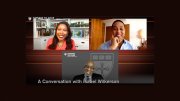In the first of a six-month series of public conversations focused on storytelling and public health—“powerful narratives for a healthier world,” as Michelle Williams, dean of the Harvard T.H. Chan School of Public Health, phrased it—Pulitzer Prize-winning journalist and author Isabel Wilkerson appeared (virtually) at Harvard this Monday to talk about the long legacy of oppression and racial hierarchy afflicting the nation’s well-being. The public event was organized jointly by the Harvard Chan School and the Nieman Foundation, and more than 1,000 viewers tuned in online.
Moderated by CNN anchor Don Lemon, the discussion circled many of the animating themes of Wilkerson’s most recent book, Caste: The Origins of Our Discontents, which sketches out a racial caste system that underlies American democracy and Americans’ daily lives in profound and disfiguring ways. Through that lens, Lemon and Wilkerson reflected on recent events in the country’s public life: the pandemic and its unfathomable death toll (disproportionately borne by nonwhites), the surrealities of the Trump presidency, the storming of the Capitol by Trump supporters carrying Confederate flags, the inauguration of Joe Biden.
Thinking about poet Amanda Gorman ’20, whose performance at Biden’s inauguration won instant fame and admiration across the country, Wilkerson wondered how many others like Gorman there might have been in generations past: black would-be artists or intellectuals whose gifts were stifled by slavery and Jim Crow. “Many people speak of slavery as a sad, dark chapter in American history,” Wilkerson said, “when in fact it was the country. It was the economic, political, and social foundation of the country for longer than it was not.…That means that for 246 years, 12 generations of black people did not get a chance to be what they were inside. And that was followed by another five generations of Jim Crow, which meant that the vast majority of people who have been black on this soil did not get a chance to be who they truly could have been.”
Later during the hourlong event, several Harvard professors and well-known alumni also posed questions to Wilkerson, joining the discussion from their homes and offices. Norman professor of public health David R. Williams spoke about the pervasiveness of unconscious racial bias and its damaging effects on medical care for African American and other patients of color. Fletcher University Professor Henry Louis Gates asked Wilkerson about how culture—“high culture, low culture, in-between culture”—has helped to both reinforce and resist the caste system she writes about. (Her answer included racial caricatures on billboards and advertisements, the Aunt Jemima and Uncle Ben food brands, and the new Netflix series Bridgerton, which follows a fictional family of mixed-race high-society siblings in nineteenth-century England.)
Radcliffe Institute dean Tomiko Brown-Nagin asked about the likelihood that education could help loosen the grip of caste. Wilkerson’s response: education is crucial to any possible change. “We are not on the same page about basic facts in our country's history,” she said. “And until we can get on the same page, we will not be able to really move forward, to recognize what needs to be done, to deal with these systemic challenges. And that’s where education comes in.”
The day’s final question came from former Massachusetts governor Deval Patrick ’78, J.D. ’82. “Where do we go from here?” he asked. “Knowing what we know, how do we fix it?”
Wilkerson smiled and inhaled sharply. “You know, when I wrote [Caste],” she answered, “I specifically said that I am coming in as the building inspector of this old house that we call our country.” The book, she explained, was not an argument, but “a prayer for our country,” an effort to diagnose “what we have not been able to see” and therefore have not been able to heal. “This is an attempt to awaken everybody to see what we are truly dealing with. I leave it up to the people in these respective systems, these respective fields of endeavor that are so clearly in need of repair, if not overhaul, to see what needs to be done, because they’re the experts in it,” she added. But in the meantime, she called for some form of truth and reconciliation commission. “And not the ones that just have people recount their wounds and then go home,” she said, “but to really confront what we have inherited as a country. To be able to make the repairs necessary for this structure that we call America to be stronger…not just for our families and our communities, but for the country and for the species and for the planet.”









